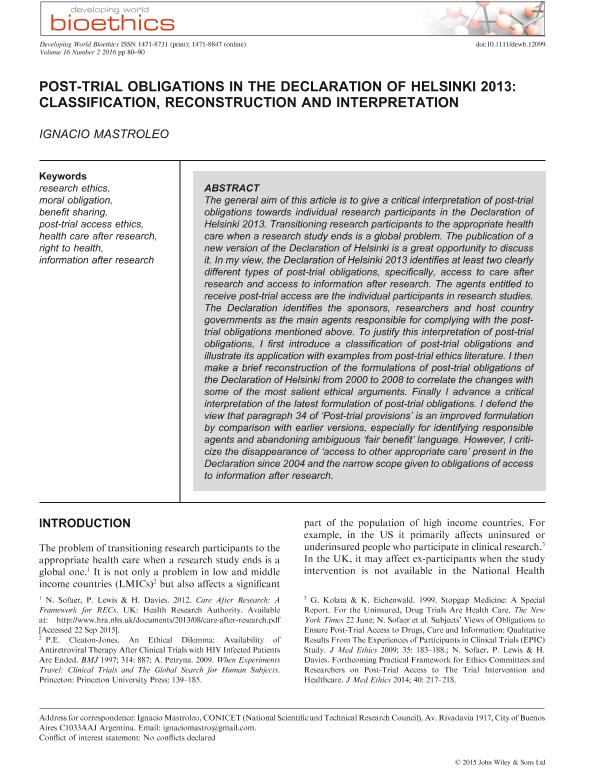Mostrar el registro sencillo del ítem
dc.contributor.author
Mastroleo, Ignacio Damian

dc.date.available
2018-05-29T21:38:35Z
dc.date.issued
2016-08
dc.identifier.citation
Mastroleo, Ignacio Damian; Post-trial obligations in the Declaration of Helsinki 2013: classification, reconstruction and interpretation; Wiley Blackwell Publishing, Inc; Developing World Bioethics; 16; 2; 8-2016; 80-90
dc.identifier.issn
1471-8731
dc.identifier.uri
http://hdl.handle.net/11336/46553
dc.description.abstract
The general aim of this article is to give a critical interpretation of post‐trial obligations towards individual research participants in the Declaration of Helsinki 2013. Transitioning research participants to the appropriate health care when a research study ends is a global problem. The publication of a new version of the Declaration of Helsinki is a great opportunity to discuss it. In my view, the Declaration of Helsinki 2013 identifies at least two clearly different types of post‐trial obligations, specifically, access to care after research and access to information after research. The agents entitled to receive post‐trial access are the individual participants in research studies. The Declaration identifies the sponsors, researchers and host country governments as the main agents responsible for complying with the post‐trial obligations mentioned above. To justify this interpretation of post‐trial obligations, I first introduce a classification of post‐trial obligations and illustrate its application with examples from post‐trial ethics literature. I then make a brief reconstruction of the formulations of post‐trial obligations of the Declaration of Helsinki from 2000 to 2008 to correlate the changes with some of the most salient ethical arguments. Finally I advance a critical interpretation of the latest formulation of post‐trial obligations. I defend the view that paragraph 34 of ‘Post‐trial provisions’ is an improved formulation by comparison with earlier versions, especially for identifying responsible agents and abandoning ambiguous ‘fair benefit’ language. However, I criticize the disappearance of ‘access to other appropriate care’ present in the Declaration since 2004 and the narrow scope given to obligations of access to information after research.
dc.format
application/pdf
dc.language.iso
eng
dc.publisher
Wiley Blackwell Publishing, Inc

dc.rights
info:eu-repo/semantics/openAccess
dc.rights.uri
https://creativecommons.org/licenses/by-nc-sa/2.5/ar/
dc.subject
Post-Trial Access Ethics
dc.subject
Right to Health
dc.subject
Benefit Sharing
dc.subject
Research Ethics
dc.subject.classification
Estudios Religiosos

dc.subject.classification
Filosofía, Ética y Religión

dc.subject.classification
HUMANIDADES

dc.subject.classification
Salud Ocupacional

dc.subject.classification
Ciencias de la Salud

dc.subject.classification
CIENCIAS MÉDICAS Y DE LA SALUD

dc.title
Post-trial obligations in the Declaration of Helsinki 2013: classification, reconstruction and interpretation
dc.type
info:eu-repo/semantics/article
dc.type
info:ar-repo/semantics/artículo
dc.type
info:eu-repo/semantics/publishedVersion
dc.date.updated
2018-05-29T18:37:17Z
dc.journal.volume
16
dc.journal.number
2
dc.journal.pagination
80-90
dc.journal.pais
Reino Unido

dc.journal.ciudad
Londres
dc.description.fil
Fil: Mastroleo, Ignacio Damian. Consejo Nacional de Investigaciones Científicas y Técnicas; Argentina
dc.journal.title
Developing World Bioethics

dc.relation.alternativeid
info:eu-repo/semantics/altIdentifier/doi/https://dx.doi.org/10.1111/dewb.12099
dc.relation.alternativeid
info:eu-repo/semantics/altIdentifier/url/https://onlinelibrary.wiley.com/doi/abs/10.1111/dewb.12099
Archivos asociados
